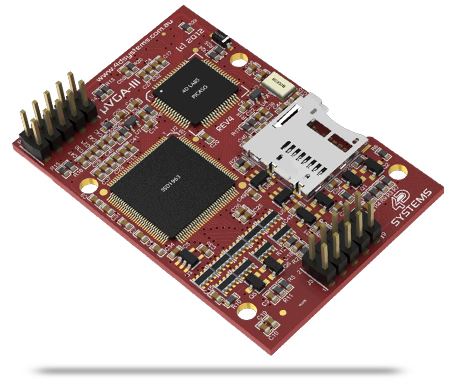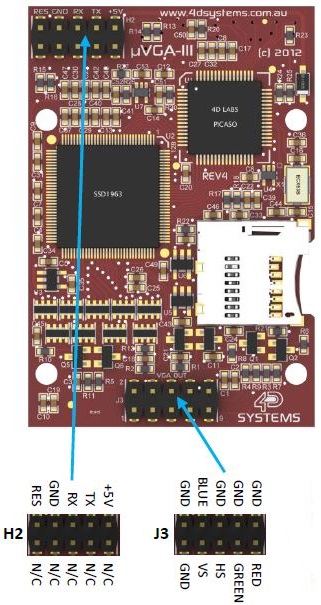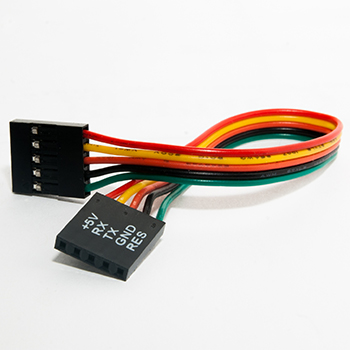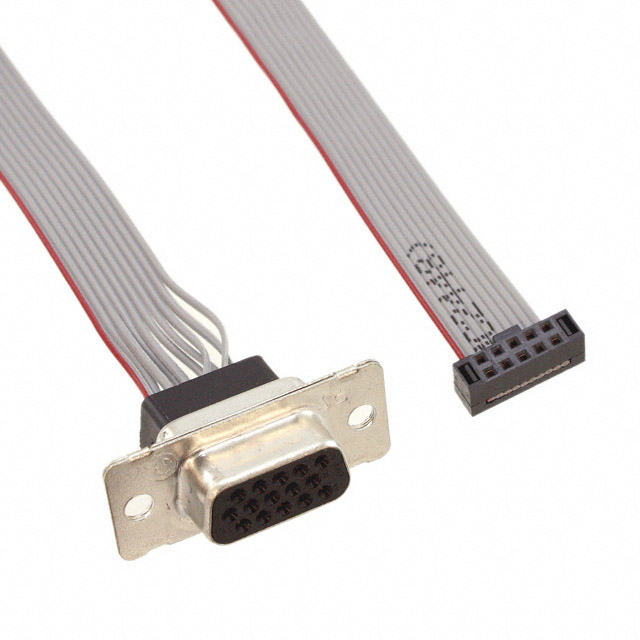uVGAIII
Team Member
Jingyi Zhang, jyzhang@gatech.edu
Jian Yuan, jian.yuan@gatech.edu
Brief Discription

The uVGA-III board from 4D Systems.
The uVGA-III is a compact and cost effective VGA Graphics Engine packed with plenty of features, ready to become the GUI for your target application, and capable of being an interface controller for a number of applications. They are available from Sparkfun.
In Serial mode, uVGA-III can be used as a slave serial graphics controller. This enables the user to use the microcontroller or serial device as the Host. By default, each module shipped from the 4D Systems factory will come pre-programmed ready for use in the Serial mode.
Datasheet
Datasheet of the uVGA-III board.
Datasheet of the PICASO processor.
Hello World!
Here is a uVGA II demo program to try:
Import programuVGAIII_demo
A demo program using uVGAIII board.
Schematic

Wiring
Here is the wiring for the demo program.
| mbed | uVGA III | VGA adapter cable |
|---|---|---|
| 5V=VU | 5V | |
| Gnd | Gnd | |
| TX=P9 | RX | |
| RX=P10 | TX | |
| P11 | Reset | |
| p10(J3) | Red line |

In the drawing above, the pins are labeled from the uVGA-III perspective with TX and RX pins. Mbed RX goes to uVGA-III TX and mbed TX goes to uVGA-III RX. So mbed TX goes to the middle pin on the connector which is the uVGA-III's RX pin. The included cable seen below is plugged into the top row of pins and plugged into a breadboard using the male header pins for hookup. The picture below is a female one. Note that on the cable silkscreen seen in the image below RX and TX have been swapped to indicate the connections needed to the microprocessor pins.

Below is the VGA adapter cable.

For the other part of pins on the uVGA-III board, that is J3, we just use a VGA adapter cable to connect the uVGA-III board to the VGA cable which is connected to the monitor. Note that the red line on the cable should be connected to the p10 of J3 on the uVGA-III board.
Demo
This picture shows what the demo codes implement. The mbed uVGA-III demo program output on a VGA monitor in 800 by 480 mode.

Watch the video to see how it works.
Below is the code of the main function to implement the things we watch in the video.
main.cpp
//
// uVGAIII is a class to drive 4D Systems TFT touch screens
//
// Copyright (C) <2010> Stephane ROCHON <stephane.rochon at free.fr>
//
// uVGAIII is free software: you can redistribute it and/or modify
// it under the terms of the GNU General Public License as published by
// the Free Software Foundation, either version 3 of the License, or
// (at your option) any later version.
//
// uVGAIII is distributed in the hope that it will be useful,
// but WITHOUT ANY WARRANTY; without even the implied warranty of
// MERCHANTABILITY or FITNESS FOR A PARTICULAR PURPOSE. See the
// GNU General Public License for more details.
//
// You should have received a copy of the GNU General Public License
// along with uVGAIII. If not, see <http://www.gnu.org/licenses/>.
#include "mbed.h"
#include "uVGAIII.h"
#define SIZE_X 480
#define SIZE_Y 800
// overwrite 4DGL library screen size settings in uVGAIII.h
uVGAIII ecran(p9,p10,p11); // serial tx, serial rx, reset pin;
int main() {
char c;
printf("\n\n-----Starting-----\n\n");
ecran.baudrate(128000);
ecran.screen_mode(LANDSCAPE);
ecran.graphics_parameters(RESOLUTION, 2); // set screen resolution to 800*480
ecran.touch_status();
ecran.background_color(DGREY);
ecran.cls();
ecran.circle(120, 160, 80, CYAN);
ecran.filled_triangle(320, 100, 340, 300, 500, 270, LIME);
ecran.move_cursor(5, 60);
ecran.char_width('d');
ecran.char_height('d');
ecran.text_fgd_color(MAGENTA);
ecran.text_bgd_color(YELLOW);
ecran.put_string("This is a test of string!\nHappy Pi Day :-)");
ecran.move_cursor(10, 10);
ecran.puts("This is a test of puts...\n");
ecran.move_cursor(15, 98);
ecran.printf("This is a test of printf!\rMew...\nYeah!");
ecran.move_cursor(20,10);
ecran.printf("Starting real-time display...\n\n");
ecran.move_cursor(20,78);
while((c=getchar())!= '~'){ // when type '~', exit the real time display
ecran.printf("%c",c);
}
ecran.printf("\n\nClosing real-time display...\n");
printf("\n\n-----Completed-----\n\n");
}
Library
Import libraryuVGAIII
Library for uVGAIII
API
Import library
Public Member Functions |
|
| void | cls () |
|
Clear the entire screen using the current background colour.
|
|
| void | reset () |
|
Reset screen.
|
|
| void | baudrate (int speed) |
|
Set serial Baud rate (both sides : screen and mbed)
|
|
| void | set_volume (char value) |
|
Set internal speaker to specified value.
|
|
| void | screen_mode (char mode) |
|
Set the graphics orientation.
|
|
| void | background_color (int color) |
|
Set background color of the screen.
|
|
| void | circle (int x, int y, int radius, int color) |
|
Draw a circle.
|
|
| void | filled_circle (int x, int y, int radius, int color) |
|
Draw a filled circle.
|
|
| void | triangle (int x1, int y1, int x2, int y2, int x3, int y3, int color) |
|
Draw a triangle.
|
|
| void | filled_triangle (int x1, int y1, int x2, int y2, int x3, int y3, int color) |
|
Draw a filled triangle.
|
|
| void | line (int x1, int y1, int x2, int y2, int color) |
|
Draw a line.
|
|
| void | rectangle (int x1, int y1, int x2, int y2, int color) |
|
Draw a rectangle.
|
|
| void | filled_rectangle (int, int, int, int, int) |
|
Draw a filled rectangle.
|
|
| void | ellipse (int x, int y, int radius_x, int radius_y, int color) |
|
Draw a ellipse.
|
|
| void | filled_ellipse (int x, int y, int radius_x, int radius_y, int color) |
|
Draw a filled ellipse.
|
|
| void | button (int state, int x, int y, int buttoncolor, int txtcolor, int font, int txtWidth, int txtHeight, char *text) |
|
Draw a button.
|
|
| void | panel (int state, int x, int y, int Width, int Height, int color) |
|
Draw a panel.
|
|
| void | slider (char mode, int x1, int y1, int x2, int y2, int color, int scale, int value) |
|
Draw a slider.
|
|
| void | put_pixel (int x, int y, int color) |
|
Draw a pixel.
|
|
| int | read_pixel (int x, int y) |
|
Read the color value of the pixel.
|
|
| void | screen_copy (int xs, int ys, int xd, int yd, int width, int height) |
|
Copy an area of a screen.
|
|
| void | clipping (char value) |
|
Enable or disable the ability for Clipping to be used.
|
|
| void | set_clipping_win (int x1, int y1, int x2, int y2) |
|
Specifiy the clipping window region on the screen.
|
|
| void | extend_clip_region () |
|
Force the clip region to the extent of the last text.
|
|
| void | change_color (int oldColor, int newColor) |
|
Change all old color pixels to new color within the clipping window area.
|
|
| void | move_origin (int xpos, int ypos) |
|
Move the origin to a new position.
|
|
| void | line_pattern (int pattern) |
|
Set the line pattern.
|
|
| void | outline_color (int color) |
|
Set the outline color for rectangles and circles.
|
|
| void | transparency (char mode) |
|
Set whether to enable the transparency.
|
|
| void | transparent_color (int color) |
|
Set the color to be transparent.
|
|
| void | graphics_parameters (int function, int value) |
|
Set graphics parameters.
|
|
| void | set_font (char mode) |
|
Set font mode.
|
|
| void | move_cursor (int line, int column) |
|
Move teh text cursor to a screen postion.
|
|
| void | text_opacity (char mode) |
|
Set whether or not the 'background' pixels are drawn.
|
|
| void | text_width (int multiplier) |
|
Set the text width multiplier between 1 and 16.
|
|
| void | text_height (int multiplier) |
|
Set the text height multiplier between 1 and 16.
|
|
| void | text_x_gap (int pixelcount) |
|
Set the pixel gap between characters(x-axis)
|
|
| void | text_y_gap (int pixelcount) |
|
Set the pixel gap between characters(y-axis)
|
|
| void | text_bold (char mode) |
|
Set the bold attribute for the text.
|
|
| void | text_inverse (char mode) |
|
Inverse the background and foreground color of the text.
|
|
| void | text_italic (char mode) |
|
Set the text to italic.
|
|
| void | text_underline (char mode) |
|
Set the text to underlined.
|
|
| void | text_attributes (int value) |
|
Control several functions grouped, Text Bold, Text Italic, Text Inverse, Text Underlined.
|
|
| void | put_char (char c) |
|
Print a single character on the display.
|
|
| void | put_string (char *s) |
|
Print a string on the display.
|
|
| void | text_fgd_color (int color) |
|
Set the text foreground color.
|
|
| void | text_bgd_color (int color) |
|
Set the text background color.
|
|
| void | char_width (char c) |
|
calculate the width in pixel units for a character
|
|
| void | char_height (char c) |
|
calculate the height in pixel units for a character
|
|
| void | putc (char c) |
|
place char at current cursor position used by virtual printf function _putc
|
|
| void | puts (char *s) |
|
place string at current cursor position
|
|
| void | detect_touch_region (int x1, int y1, int x2, int y2) |
|
Specify a new touch detect region on the screen.
|
|
| void | touch_get_x (int *x) |
|
Get X coordinates of the touch.
|
|
| void | touch_get_y (int *y) |
|
Get Y coordinates of the touch.
|
|
| void | touch_set (char mode) |
|
Set various touch screen related parameters.
|
|
| int | touch_status (void) |
|
Get the status of the screen.
|
|
Please log in to post comments.
